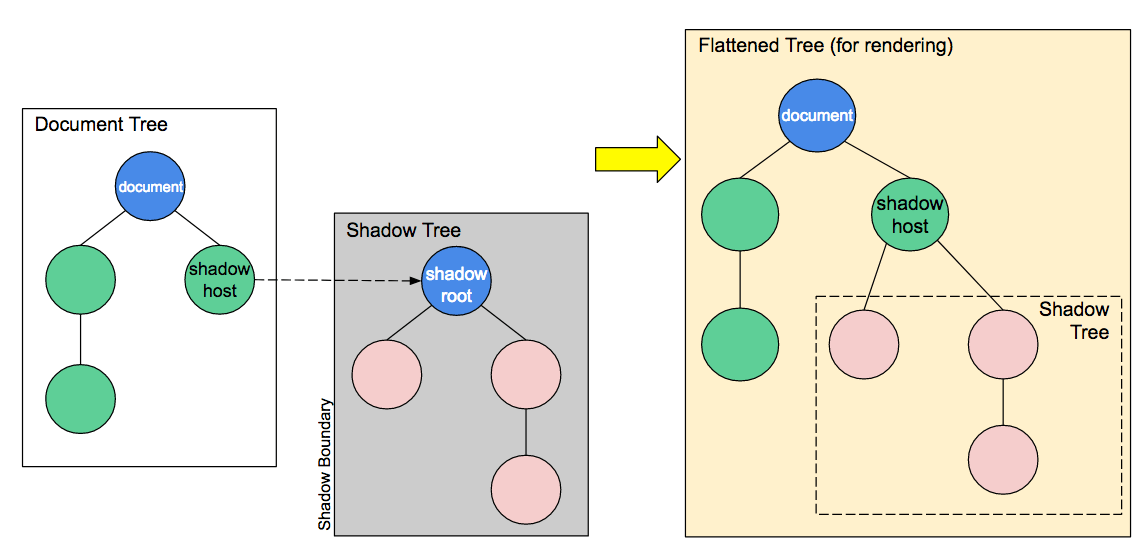Web Component
TIP
Web Component 是一个浏览器支持的原生组件,也可能是未来组件化(高内聚、可重用、可组合)开发的趋势
一、简介
1 参考链接
2 特点
- 优点:原生组件,不需要框架,性能好代码少
- 缺点:兼容性差,没有自动更新机制
二、核心三大件
- Custom elements(自定义元素):一组JavaScript API,允许您定义custom elements及其行为,然后可以在您的用户界面中按照需要使用它们
- Shadow DOM(影子DOM):一组JavaScript API,用于将封装的“影子”DOM树附加到元素(与主文档DOM分开呈现)并控制其关联的功能。通过这种方式,您可以保持元素的功能私有,这样它们就可以被脚本化和样式化,而不用担心与文档的其他部分发生冲突
- HTML templates(HTML模板):
<template>和<slot>元素使您可以编写不在呈现页面中显示的标记模板。然后它们可以作为自定义元素结构的基础被多次重用
三、生命周期
- connectedCallback:当custom element首次被插入文档DOM时,被调用
- disconnectedCallback:当 custom element从文档DOM中删除时,被调用
- adoptedCallback:当 custom element被移动到新的文档时,被调用 (移动到iframe中)
- attributeChangedCallback:当 custom element增加、删除、修改自身属性时,被调用
四、使用方法
- 使用 CustomElementRegistry.define() 方法注册您的新自定义元素 ,并向其传递要定义的元素名称、指定元素功能的类、以及可选的其所继承自的元素
- 使用Element.attachShadow() 方法将一个shadow DOM附加到自定义元素上。使用通常的DOM方法向shadow DOM中添加子元素、事件监听器等等
- 使用
<template>和<slot>定义一个HTML模板。再次使用常规DOM方法克隆模板并将其附加到您的shadow DOM中
1 Custom elements
- 具体教程
- custom elements含义为自定义标签
- 主要通过CustomElementRegistry接口中的CustomElementRegistry.define(name, class, extends) 方法来注册一个自定义元素,具体参数如下:
- name 自定义元素名称,名称不能是单个单词,必须用中横线隔开,避免与native标签冲突
- class 自定义元素的类
- extends 可选参数,指定继承的已创建的元素,被用于创建自定义元素
// 语法
customElements.define(name, constructor, options);
// 案例
window.customElements.define('lxh-button', LxhButton)
2 Shadow DOM
- Shadow DOM 可以实现真正的隔离机制,即隐藏DOM树

// 案例
class LxhButton extends HTMLElement{
constructor(){
super();
// 1 创建影子
let shadow = this.attachShadow({mode:'open'});
// 2 获取或者创造页面元素
let btn = document.getElementById('btn');
let cloneTemplate = btn.content.cloneNode(true); // 拷贝模板
shadow.appendChild(cloneTemplate)
// 3 编写样式
const style = document.createElement('style');
style.textContent = `
.btn-wrapper {
position: relative;
}
.btn {
// ...
}
`
shadow.appendChild(style);
}
}
3 HTML templates
- 具体教程
- template 中的内容就是自定义的组件内容,slot 为组件插槽,可以插入到模板对应的位置
// 案例
<lxh-button type="primary">自定义原生按钮</lxh-button>
<template id="btn">
<button class="btn-wrapper">
<slot>按钮</slot>
</button>
</template>
五、自定义按钮-Button
<!DOCTYPE html>
<html lang="en">
<head>
<meta charset="UTF-8">
<meta http-equiv="X-UA-Compatible" content="IE=edge">
<meta name="viewport" content="width=device-width, initial-scale=1.0">
<title>Document</title>
</head>
<body>
<style>
/* 用户自定义最外层的样式 */
:root {
--background-color: black;
--text-color: yellow
}
</style>
<!-- 使用组件 -->
<lxh-button type="primary">自定义原生按钮</lxh-button>
<!-- 自定义组件模板 -->
<template id="btn">
<button class="btn-wrapper">
<slot>按钮</slot>
</button>
</template>
<script>
class LxhButton extends HTMLElement {
constructor() {
super();
// 1 创建影子
let shadow = this.attachShadow({ mode: 'open' });
// 2 获取模板按钮元素
let btn = document.getElementById('btn');
// 由于dom操作具备移动性,所以需要拷贝一份
let cloneTemplate = btn.content.cloneNode(true);
shadow.appendChild(cloneTemplate)
// 3 编写样式
const style = document.createElement('style');
// 获取组件中传入的属性type
let type = this.getAttribute('type') || 'default';
// 定义不同类型的样式
const btnList = {
'primary': {
background: '#409eff',
color: '#fff'
},
'default': {
background: '#909399',
color: '#fff'
}
}
// 使用样式,如果最外层没有传入,就使用默认的
style.textContent = `
.btn-wrapper {
outline:none;
border:none;
border-radius:4px;
padding:5px 20px;
display:inline-flex;
background:var(--background-color, ${btnList[type].background});
color:var(--text-color, ${btnList[type].color});
cursor:pointer
}
`
shadow.appendChild(style);
}
}
// 注册自定义组件
window.customElements.define('lxh-button', LxhButton);
</script>
</body>
</html>
六、折叠面板-Collapse
- 难点:子组件与父组件通信,使用自定义事件派发机制
1 目录结构
├─collapse.html
├─collapse.js
├─collapse-item.js
├─index.js
2 具体代码
collapse.html
<!DOCTYPE html>
<html lang="en">
<head>
<meta charset="UTF-8">
<meta http-equiv="X-UA-Compatible" content="IE=edge">
<meta name="viewport" content="width=device-width, initial-scale=1.0">
<title>Document</title>
</head>
<body>
<!-- 使用组件 -->
<lxh-collapse>
<lxh-collapse-item title="Node" name="1">
<div>nodejs welcome</div>
</lxh-collapse-item>
<lxh-collapse-item title="react" name="2">
<div>react welcome</div>
</lxh-collapse-item>
<lxh-collapse-item title="vue" name="3">
<div>vue welcome</div>
</lxh-collapse-item>
</-collapse>
<!-- 组件模板:没有实际意义, 不会渲染到页面上 -->
<template id="collapse_tmpl">
<div class="lxh-collapse">
<slot></slot>
</div>
</template>
<template id="collapse_item_tmpl">
<div class="lxh-collapse-item">
<div class="title"></div>
<div class="content">
<slot></slot>
</div>
</div>
</template>
<!-- 引入JS -->
<script src="./index.js" type="module"></script>
</body>
</html>
index.js
import Collapse from './collapse.js';
import CollapseItem from './collapse-item.js';
// 注册组件
window.customElements.define('lxh-collapse', Collapse);
window.customElements.define('lxh-collapse-item', CollapseItem);
// 设置组件默认显示的状态
let defaultActive = ['1', '2']; // name:1 name:2 默认展开 3 应该隐藏
document.querySelector('lxh-collapse').setAttribute('active', JSON.stringify(defaultActive));
// 每个item需要获取到defaultActive 和自己的name属性比较,如果在里面就显示,不在里面就隐藏
document.querySelector('lxh-collapse').addEventListener('changeName', (e) => {
let { isShow, name } = e.detail;
if (isShow) {
let index = defaultActive.indexOf(name);
defaultActive.splice(index, 1);
} else {
defaultActive.push(name);
}
document.querySelector('lxh-collapse').setAttribute('active', JSON.stringify(defaultActive));
});
collapse.js
class Collapse extends HTMLElement {
constructor() {
super();
const shadow = this.attachShadow({ mode: 'open' });
const tmpl = document.getElementById('collapse_tmpl');
let cloneTemplate = tmpl.content.cloneNode(true);
shadow.appendChild(cloneTemplate);
let style = document.createElement('style');
// :host 代表的是影子的根元素
style.textContent = `
:host{
display:flex;
border:3px solid #ebebeb;
border-radius:5px;
width:100%;
}
.lxh-collapse{
width:100%;
}
`
shadow.appendChild(style);
// 获取slot,监控slot变化
let slot = shadow.querySelector('slot');
slot.addEventListener('slotchange', (e) => {
this.slotList = e.target.assignedElements();
this.render();
})
}
// 监控属性的变化
static get observedAttributes() {
return ['active']
}
// 属性更新
attributeChangedCallback(key, oldVal, newVal) {
if (key == 'active') {
this.activeList = JSON.parse(newVal);
this.render();
}
}
// 重新渲染方法
render() {
if (this.slotList && this.activeList) {
[...this.slotList].forEach(child => {
child.setAttribute('active', JSON.stringify(this.activeList))
});
}
}
// connectedCallback(){
// console.log('插入到dom时执行的回调')
// }
// disconnectedCallback(){
// console.log('移除到dom时执行的回调')
// }
// adoptedCallback(){
// console.log('将组件移动到iframe 会执行')
// }
}
export default Collapse
collapse-item.js
class CollapseItem extends HTMLElement {
constructor() {
super();
let shadow = this.attachShadow({ mode: 'open' });
let tmpl = document.getElementById('collapse_item_tmpl');
let cloneTemplate = tmpl.content.cloneNode(true);
shadow.appendChild(cloneTemplate);
let style = document.createElement('style');
style.textContent = `
:host{
width:100%;
}
.title{
background:#f1f1f1;
line-height:35px;
height:35px;
}
.content{
font-size:14px;
}
`
shadow.appendChild(style)
// 一些初始化变量
this.isShow = true; // 标识自己是否需要显示
this.titleEle = shadow.querySelector('.title');
this.titleEle.addEventListener('click', () => {
// 如果将结果传递给父亲 组件通信?
document.querySelector('lxh-collapse').dispatchEvent(new CustomEvent('changeName', {
detail: {
name: this.getAttribute('name'),
isShow: this.isShow
}
}))
})
}
// 监控属性的变化
static get observedAttributes() {
return ['active', 'title', 'name']
}
// 属性更新
attributeChangedCallback(key, oldVal, newVal) {
switch (key) {
case 'active':
this.activeList = JSON.parse(newVal); // 子组件接受父组件的数据
break;
case 'title':
this.titleEle.innerHTML = newVal; // 接受到title属性 作为dom的title
break;
case 'name':
this.name = newVal
break;
}
let name = this.name;
if (this.activeList && name) {
this.isShow = this.activeList.includes(name);
this.shadowRoot.querySelector('.content').style.display = this.isShow ? 'block' : 'none'
}
}
}
export default CollapseItem